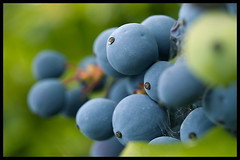I've been working out at the university's farm for over a month now, and things are starting to come along. Since I'm getting back into the swing of things, I thought I'd share what I've been up to.
The window garden has taken on a new look this season. The new apartment isn't as Topsy Turvy friendly as the old dorm room, so I'm sticking with just the window boxes this time. I have loose-leaf lettuce growing in one of my four boxes and I pick it off as I need it for tacos, sandwiches, wraps, and burgers. I've had one basil plant going for a few months now, and it's been producing more basil than I can use. Ignoring that fact--and anticipating a good tomato harvest--I planted my remaining window boxes with basil. I hope to make lots of pasta sauce this year since pasta is probably the number one staple of this college student.
That means I'll be canning! Since I get all of the free produce I can stand from the farm where I work (and since so much of it went to waste last year because no one used it), I've been getting really excited about preserving the stuff that I harvest.
First, the research. Even though we helped our grandparents can vegetables every summer, I hadn't paid much attention to the details. We canned lots of pickles (both beet and cucumber), but it turns out that canning and pickling are two separate things. Who knew? Pickling typically uses salt and vinegar to preserve food. Canning heats the food in question and seals the jar that contains it. The things that I've read say that pickling will preserve your food for "several weeks" (and that's the best estimate I've seen so far). I go to CanningUSA.com for canning recipes and instructions, and they suggest using your canned food within a year to keep it from losing its nutritional value.
Additionally, I've found more than one way to pickle. You can drench your cucumbers in vinegar and various spices as I grew up doing, or you can pickle them in a more traditional sense by leaving them to ferment in a jar. People refer to these as "live" or "living" pickles. I stocked up on cucumbers at the cafeteria's salad bar and used Lynn's Favorite Fermented Pickles recipe as the basis for my own concoction. I didn't have the pepper flakes or the green onion so I just omitted them. I also guessed on the number of cucumbers I had since they were already sliced. I love garlic, so I added way more than the recipe called for. End result: I overestimated the amount of cucumber I had so these turned out a little saltier than I would have preferred. And did I mention that I went overboard on the garlic? It was a bit much, even for a garlic-lover like me. After just one slice you could have cleared a room of an army of vampires. They were still edible though, so I finished them off one-by-one. The next time I try these I'll make sure I'm using the proper proportions of ingredients.
Since then I've pickled beets, for which I found no recipe for living pickles. I roasted the beets at 400 degrees in the oven in about a 1/2 " of water for an hour or so (trim off all but an inch of the greens, but leave the ends otherwise intact). After you pull them out and they have a chance to cool, cut off the ends and peel off the skins. I actually sliced the beets 1/8-1/4" thick and then peeled the skins off and found that this was much easier. This is very messy and beet juice will stain like mad. Wear clothes you're willing to sacrifice! Pickle recipes I've seen haven't been as anal about sterilizing jars as canning recipes, so I grabbed an old pickle jar (the big ones you buy whole pickles in at the store) and packed the beet slices in. In a sauce pan I heated three cups of sugar and three cups of vinegar until the sugar melted and then stirred in cinamon to taste. Add this to the jar of beets until they're covered. The directions say to let them sit a few days, but that didn't keep me from getting into them the next day. Try to limit yourself to about 4 or 5 slices a day otherwise your bodily wastes will be dyed a purplish-red. This isn't any cause for alarm as far as I know, I just find it unnerving to have strangely colored fluids coming out of me.
That's it for now. I've done a little other preserving, but I haven't canned anything yet. I did, however, pick up jars , a water bath canner
, a water bath canner , and all of the necessary accessories
, and all of the necessary accessories when I picked up vinegar for the beets. The next batch of beets I pick will probably be canned whole or in quarters, and I'm looking forward to all of those tomatoes.
when I picked up vinegar for the beets. The next batch of beets I pick will probably be canned whole or in quarters, and I'm looking forward to all of those tomatoes.
More next time.

